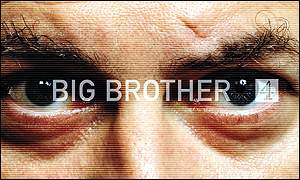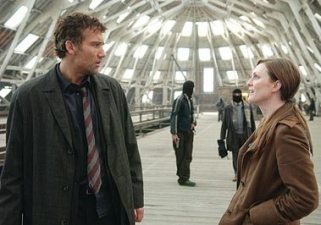Day Two: Dystopia Has No Future
 ...Day One of the Conversation...
...Day One of the Conversation...
Though I share Nate's enthusiasm for genre pictures, I'm not entirely sure that Dana Stevens was trying to make a point about Oscar bait so much as about the war genre specifically. And I think that by ignoring "Oscar bait" movies wholesale, we become just as guilty as those who succumb to them wholesale, when what we should be doing is not accepting them as a real category. The other risk is that we wind up missing out on the occasional great film that shines through the PR/marketing blitz. (In fact, these occasional great films are often directed by Clint Eastwood *cough.)
So I think it is more useful to discuss these categories and genres specifically, as Dana Stevens did about war films. For me, the genre du jour that warrants some scrutiny is the dystopia film. Long a narrative conveniently suited for message-artists, dystopias are frequently used as a fusion of the sci-fi and social problem genres. 2006 was filled with them.
First there was V for Vendetta, a movie that took place in the future, but was so steeped in the aesthetics of mid-twentieth century visions of the future that it played like a period film. One can imagine that the Wachowski brothers and whoever directed the film were vaguely interested in applying the fascist imagery - leather outfits and all - to the current administration, Patriot Act, etc. But it really was as simple and shallow as that: a kind of cut-and-paste application of the most kneejerk variety. V, the film's terrorist-hero, couldn't begin to bear any resemblance to a twenty-first century terrorist because he is a class hero, not a religious hero (and therefore, his mission abides by a certain degree of logic - he's trying to change the world, not enter a new one). The reason the film could play in a multiplex was precisely because its (purportedly subversive) glorification of a terrorist is safely irrelevant to the modern world. Terrorists that make sense no longer exist.
Then there was the film that no one saw called Idiocracy. I finally caught up with the film on Netflix last week, and for those that aren't familiar with its backstory, it was only given a limited theatrical release by Fox (excluding the usual markets - no New York!), apparently because the subject matter may have offended corporate interests. Of course, nothing could lend more street cred to a film than this. But unfortunately, no film deserves less street cred. The movie's central conceit is that, unlike most sci-fi films, here the future is not depicted as more advanced than the present, but as less advanced. Luke Wilson is blasted 500 years into the future and is marveled by this very idea - that people could be getting stupider. But is this conceit as new as it appears? Isn't this the very basis of dystopia, a narrative genre that emerged in the late 19th century alongside the discovery of Thermodynamics (the principle that history can devolve)? And what's more, why isn't this movie funny?
 Children of Men is, of course, the 30lb. gorilla that must be dealt with, since so many of you guys and the critical community at large seem to dig it so hard. What I like about Children of Men, aside from its obvious stylistic beauty, is that it does something rather specific in its portrayal of the devolving future: it dares to suggest that the First World (London) will start to look something more like the Third World. The street-chaos, urban decay and overpopulation that compose the mise-en-scene of the movie are ways of suggesting this, and I assume that Alfonso Cuaron having grown up in a "Third World" country contributed to the naturalism of his vision. So here's a reason to applaud the globalization of cinema - a Mexican filmmaker can bring something quite interesting to an American/European co-production.
Children of Men is, of course, the 30lb. gorilla that must be dealt with, since so many of you guys and the critical community at large seem to dig it so hard. What I like about Children of Men, aside from its obvious stylistic beauty, is that it does something rather specific in its portrayal of the devolving future: it dares to suggest that the First World (London) will start to look something more like the Third World. The street-chaos, urban decay and overpopulation that compose the mise-en-scene of the movie are ways of suggesting this, and I assume that Alfonso Cuaron having grown up in a "Third World" country contributed to the naturalism of his vision. So here's a reason to applaud the globalization of cinema - a Mexican filmmaker can bring something quite interesting to an American/European co-production.
What I dislike about Children of Men is its premise. What does it mean exactly to suggest that children can no longer be born? If this were purely a genre conceit that served as a catalyst to a more literal-minded story, then it wouldn't bother me. But COM isn't very literal; it never explains why babies can't be born. And neither is the movie especially allegorical, except to superficially suggest that without babies, there is - dun dun dun - no future. Again, the dystopia genre is reduced to its very basis, with no expanded ideas or specificity.
I guess what I'm wondering is this: is there something about the dystopia genre that's outdated in principle? Why do all of these stories fail to provoke any serious consideration about what our future might look like, aside from basic kneejerk implications about the Bush administration?
The one 2006 dystopia movie I did like was A Scanner Darkly, I think because it was concentrated on such a specific issue and didn't attempt to be so catch-all for liberals to project onto it whatever issue seems pressing at a given moment.
Thoughts?
-J
